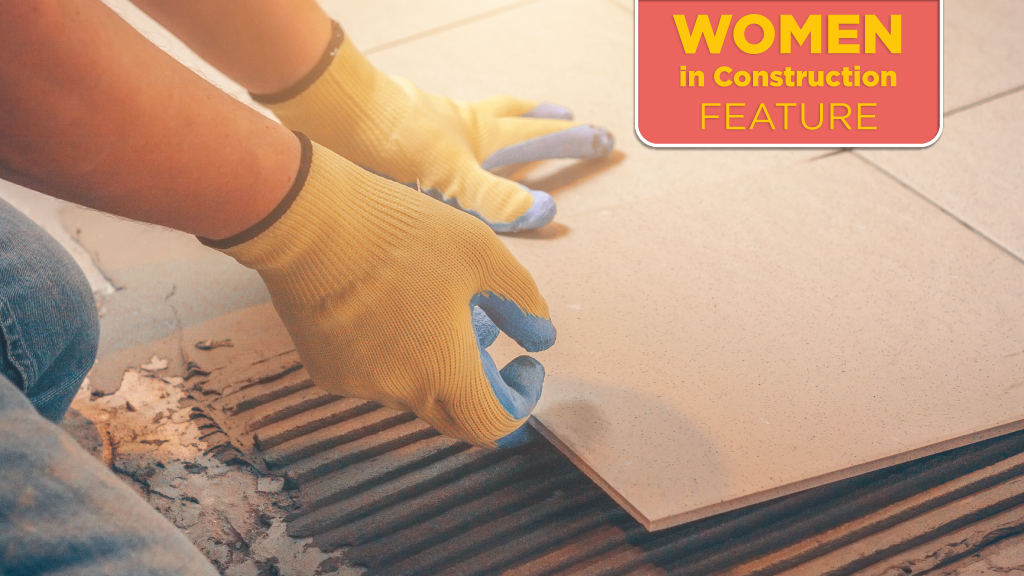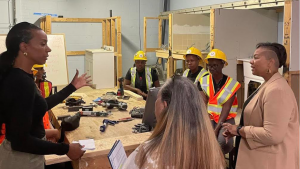As a teen, Alexandra Wells felt drawn to the trades. In high school, shop classes were her favourite. She enjoyed working with her hands and learning to use the tools. Her passions were building and creating.
“I was meant to be in the trades,” she says. “I was meant to be hands-on.”
While in high school, she enrolled in the Toronto District School Board’s STEP to �鶹��ý����ion co-op program which lets students in grades 11 and 12 spend a semester on a jobsite trying their hand at the different trades Wells also helped her dad build his house and found that she really liked tile setting.
“I like the artistic aspect of it,” she explains matter-of-factly.
“I really like being able to bring the ideas of the homeowners to life through my fingers. It’s just one of those things that I really enjoy. I like seeing the look on their faces when I accomplish their dreams and put it on their floor for them to see.”
Wells was the first woman in the STEP program. “I opened quite a few doors. Now, there’s been quite a few women that have gone through that program.”
After high school, she enrolled in Tridel’s BOLT program. She went to the Marble, Tile and Terrazzo trade school in Concord and later joined LiUNA Local 183 and worked in Toronto. She was the union’s first female tile setter.
Now 27, she has been in the trade for nearly decade. She’s an inspiration to other women seeking to get into the trades and was one of 11 speakers at a recent Create the Future virtual conference that connected working professionals with Toronto high school students who are thinking about careers choices.
At the trade school, Wells did a basic two-month tile setting course and then an advanced course of the same length. She has two certificates.
On the job, she started at the bottom, grafting and learning the trade from the ground up. She progressed quickly. Before long, she was doing tile setting. She’s also been a labourer, grouter and tile foreman.
Wells worked mostly on high-rise condos in Toronto. She became the company’s first female tile setter and its first forewoman.
While the work is creative, it is always different and there are always challenges. No two jobs are the same.
“It very much depends on what the homeowner wants,” she says.
When starting a project, Wells first squares off a room so the lines are running straight. Then she mixes the cement for the floor. The mix — whether it’s thicker or thinner — very much depends on the floor.
“You can mix it harder if you have to build it up, and a little bit on the liquid side if you have to spread it out a little bit thinner. It’s pretty versatile.”
The tiles are back-buttered, which entails spreading cement very thinly on the back side of the tile to clean away any dust or resin and anything that could prevent the tile from sticking to the cement on the floor.
When the tiles are laid, the excess cement is cleaned off and they are wiped down. Twenty-four hours later, the tile setter can return and do the grouting. Grout is applied and pushed into the joints and the excess is cleaned off with a wash.
“I take my time and rinse off my sponge often,” says Wells.
“I’m not taking the grout out of the joints or anything like that, I’m just going over, not putting any pressure on, just to clean up the resin on the tiles.”
Wells recently moved to Thorold, Ont., in the Niagara area where she is working for a company that does mostly low-rise custom homes in subdivisions.
Her plan is to continue with her present company and become the firm’s first female tile manager.
“As tile manager, I’d check on the jobs, order the material, and I’d make sure that all the jobs are ready for my crews to go in,” she says.
Wells says it can be difficult for a woman being in a heavy trade that requires a lot of physical labour and she has to work smarter.
For example, constantly lifting a heavy bucket of cement might not be an issue for a 250-pound man but for a lighter woman it can take its toll so she makes use of a cart with wheels.
As for being a female in a male-dominated trade, Wells notes it’s a bit of a Catch-22 because she’s had good and bad experiences.
“My great experiences have been a supportive crew. You get guys that are upfront and willing to work with you. Then you get some people that make sure you know you’re a female and you’re not wanted.”
Her advice for women?
“If it’s your passion, definitely go for it,” she says.
“It’s a great paycheque. I know a lot of my friends who have gone down the business way or the retail way and it’s not that they’re not making great money, but their paycheques are a little bit smaller than mine and their school bill is a lot bigger than mine.”









Recent Comments
comments for this post are closed